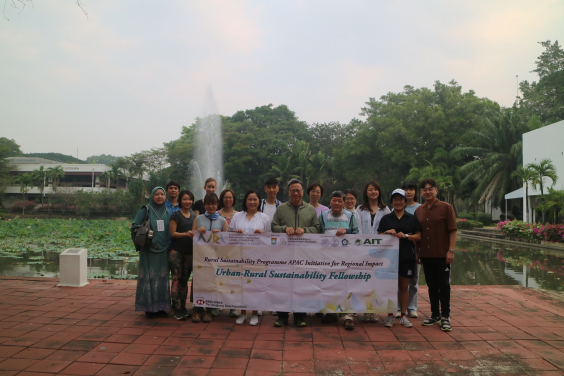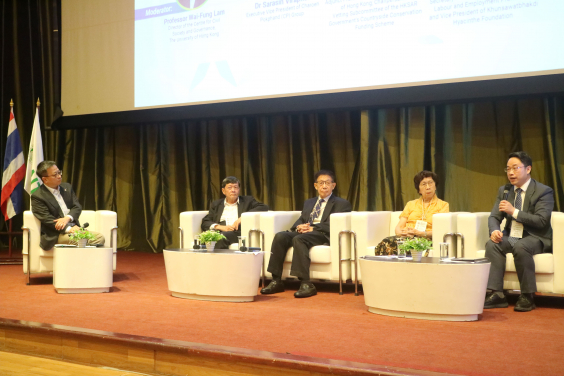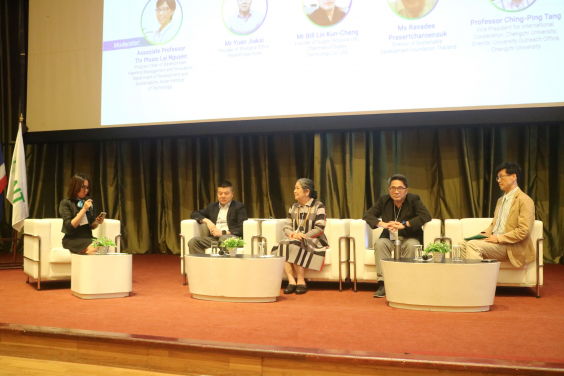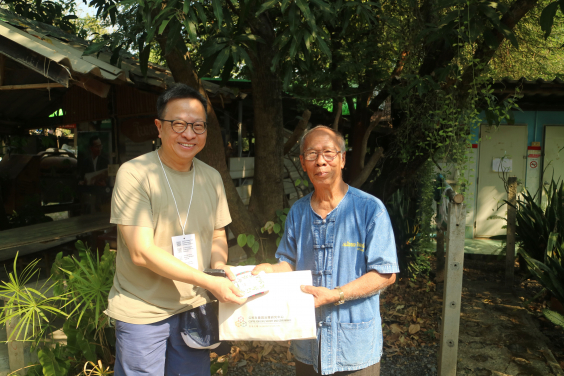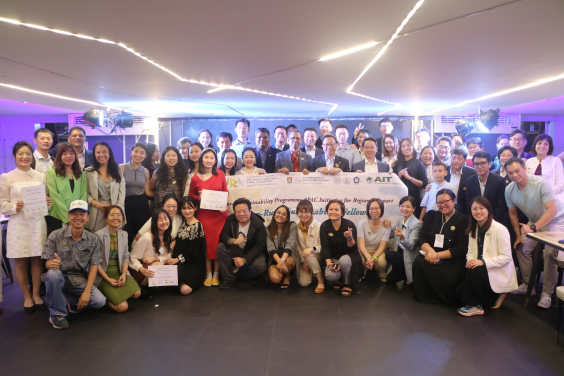Media
HKU-initiated Asia-Pacific Consortium Holds Rural Revitalisation Regional Forum in Thailand
25 Jan 2024
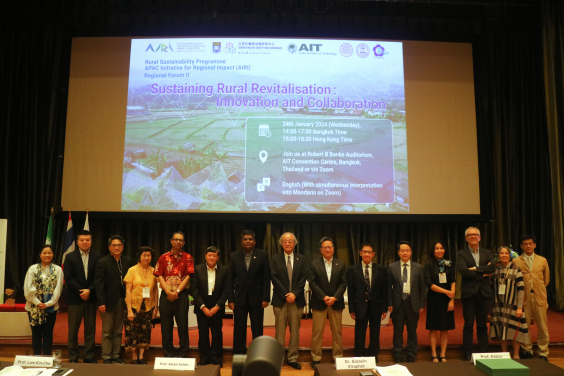
The Regional Forum gathers experts and academia from the Asia-Pacific to discuss how innovation and collaboration can build the robustness and resilience of rural community
- 1 / 7
- 2 / 7
- 3 / 7
- 4 / 7
- 5 / 7
- 6 / 7
- 7 / 7
Building on its successful rural revitalisation experience in Lai Chi Wo which reinvigorated the socio-economic vitality of rural communities through a community-based, integrated and collaborative approach, the Centre for Civil Society and Governance (CCSG) at HKU launched the “Rural Sustainability Programme – APAC Initiative for Regional Impact” (AIRI) in 2021. Supported by The Hongkong Bank Foundation, AIRI has established a regional consortium comprised of HKU, Tsinghua University (Tsinghua U), Chengchi University (NCCU) and Asian Institute of Technology (AIT) for knowledge co-creation and exchange on rural sustainability.
The consortium held the “AIRI Regional Forum II – Sustaining Rural Revitalisation: Innovation and Collaboration” in Thailand on January 22-24, 2024. The event included field trips, a symposium, and a regional forum. Delegations from Hong Kong, Mainland China, Taiwan and Thailand participated in person throughout the three days, among which included professors and staff from HKU, Tsinghua U, NCCU and AIT, as well as over 30 Fellows of the “AIRI Urban-Rural Sustainability Fellowship 2022-23” from the four regions. The Hong Kong delegation was led by Professor Wai-Fung Lam, the director of CCSG.
The delegations started the Forum with a site visit to a community sufficiency agriculture learning centre and an organic farming group in Nong Bua. The revitalisation effort there demonstrated that successful sustainable farming practices can inspire other farmers and attract visitors, and financial insight and institutional support can transform farms into organic enterprises. The delegation next visited the Thaiberng Folk Museum, community homestays and traditional weaving groups to learn about the importance of effective communication and partnerships for cultural conservation. It also highlighted how community-driven rural initiatives can provide authentic cultural experiences for tourists and generate income for the local community. On understanding how rural development could be nature and wildlife inclusive, a visit to the Pasak Cholasid Dam and its adjacent wetland and Lopburi’s heritage site were made. The 2-day field study concluded with a visit to Hua Takhe where traditional neighourhoods were revitalised through community-led, innovative experiential activities, sustainable tourism, and environmental protection.
On the third day, the symposium and the forum were attended by more than 200 online and in-person participants from across the Asia-Pacific region. Local and international academics and the winners of the AIRI Urban-Rural Sustainability Action Proposal Competition presented on rural sustainability research and rural action projects. The competition winners, who are Fellows who completed the “AIRI Urban-Rural Sustainability Fellowship 2022-23” and submitted the best rural revitalisation action proposals from Hong Kong, Mainland China, Taiwan and Thailand, are now implementing the proposals with a seed grant of up to US$25,000.
The regional forum gathered experts and practitioners from the Asia-Pacific to discuss how innovation and collaboration can build the robustness and resilience of rural communities. Four experts in academia, nonprofits, social enterprises, and food conglomerates delivered keynote presentations. Dr Sarasin Viraphol, Executive Vice President of Charoen Pokphand (CP) Group, discussed business innovation and public-private collaboration for sustainable agri-food systems and rural development. Professor Lam Kin Che, Adjunct Professor at The Chinese University of Hong Kong and Chairperson of Vetting Subcommittee of the HKSAR Government’s Countryside Conservation Funding Scheme, reflected on the successes and limitations of Hong Kong’s attempts to search for a common strategy for rural revitalisation. Mr Yuan Jiakai, Founder of Shanghai Ethno Philanthropy Fund, talked about eco-friendly farming practices and connecting with sustainability-conscious consumers to improve farmers’ livelihood and conserve the environment. Mr Bill Lin Kun-Cheng, Founder of Guppy Inclusive Ltd.; Chairman of Guppy Technology Co., Ltd., discussed how his enterprise’s collaborative project contributed to rural community support and environmental protection through food distribution.
The forum also included the AIRI Urban-Rural Sustainability Action Proposal Competition Award Ceremony. Trophies were presented to the four winning teams from Hong Kong, Mainland China, Taiwan and Thailand.
Photos can be downloaded from this link.
For media enquiries, please contact:
Ms Sianna Yiu, Centre for Civil Society and Governance, HKU (Tel.: 3917-4910; Email: sianna@hku.hk)
About APAC Initiative for Regional Impact (AIRI):
Building on the success of the Sustainable Lai Chi Wo (2013-2017) and HSBC Rural Sustainability (2017-2022) programmes which have demonstrated the viability and merits of a community-based, integrated approach to rural revitalisation as a solution to sustainability challenges, the Centre for Civil Society and Governance at HKU launched the APAC Initiative for Regional Impact (AIRI). Supported by The Hongkong Bank Foundation, AIRI has established a regional consortium comprised of HKU, Tsinghua University, Chengchi University and Asian Institute of Technology for knowledge co-creation and exchange. A core part of AIRI is the Urban-Rural Sustainability Fellowship 2022-23, which has trained over 80 Fellows and Associate Fellows for rural sustainable development in the Asia-Pacific region. To find out more information about AIRI, please visit: https://ccsg.hku.hk/airi/
About the Centre for Civil Society and Governance, The University of Hong Kong
Established in December 2002, the Centre for Civil Society and Governance (the Centre) strives to enhance our knowledge of civil society and its contribution towards good governance, and to facilitate the attainment of a sustainable society through forging community-based, innovative solutions to inform policy deliberation and collective actions. The work of the Centre is organised around three Labs—the Policy for Sustainability Lab (PSL), the Social Entrepreneurship and Civic Action Lab (SECAL), and the Nonprofits and Philanthropy Lab (NPPL); each of them representing a research focus and an area of excellence of the Centre. To find out more information, please visit: https://ccsg.hku.hk/.

